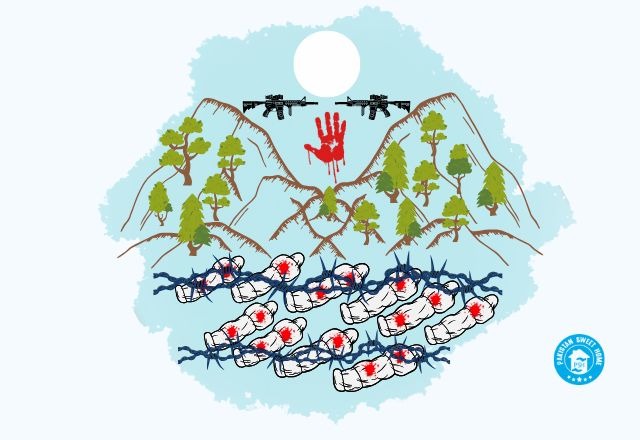In July 2024, the Parachinar incident in Pakistan's north-western frontier brought a heartbreaking tragedy.
According to Dawn News, at least forty-nine people have died, and over two hundred are injured. A small tribe in Parachinar struggles to lift a week-long blockade imposed by armed groups, some from nearby Afghanistan.
Let's explore the history, impact, government response and role of Pakistan Sweet Home for orphans of North Waziristan to this crisis:
History of Parachinar Incident
Violence in Parachinar has been a long-standing issue dating back to the early 1900s and is still ongoing. Whether it's disputes over the Thall-Parachinar road or conflicts over farmland between rival parties.
These issues have consistently resulted in violent Shia-Sunni clashes, culminating in ongoing and tragic episodes of sectarian violence and genocide.
Early 20th Century: In the early 1900s, there were fights between the Shia and Sunni communities in Parachinar. These fights started a long history of sectarian violence.
- 2007: In 2007, the violence got much worse. It started over a disagreement about farmland and led to serious fighting between the two groups. Certain state-run media in Iran had referred to Parachinar as a “Second Gaza.”
- 2011: The violence continued in the following years. By the end of this period, it was reported in 2011 by the media that about 1,100 people had been killed and many houses burned down since 2007. The government of that time Pakistan Peoples Party, promised to increase security efforts to protect Parachinar from militants.
- 2012-2016: The violence didn't stop and continued with many attacks, leading to more deaths and destruction in Parachinar.
- 2017-Present: In 2017, the violence in Parachinar gained more international attention, with media reporting extensively on the severity of the situation. The violence has continued with no end in sight, causing ongoing suffering and problems for the people of Parachinar.
The conflict in Parachinar involves a range of tribes, including Boshehra, Malikhel, Dandar, Pewar, Tari Mangal, Muqbal, Kunj Alizai, Nastikot, Para Chamkani, Karman, Khar Kalai, Sangina, and Balishkhel.
These tribes have engaged in violent clashes, targeting each other's villages with small and medium-range weapons, such as rocket launchers, mortars, and small missiles.
Impact of Violence in Parachinar on Orphans
Given the deep-rooted and ongoing violence in Parachinar, the consequences for the local population, especially orphans, have been severe.
Here’s how the violence has affected these vulnerable children.
Emotional
The ongoing violence in Parachinar has left deep emotional scars on the surviving families and orphans. Parents who have lost their children and children who have lost their parents endure overwhelming grief and trauma.
Constant violence causes fear and insecurity, making it hard for families to feel peaceful or stable. Orphans, in particular, suffer from feelings of abandonment and isolation as they cope with the sudden loss of their loved ones.
Social
The violence has drastically restricted the freedom of ordinary citizens, severely limiting their ability to move freely. This restriction makes it hard for people to get important services and live their daily lives. It can be tough for them to do regular things and get help when they need it.
Psychological
The psychological toll of the violence in Parachinar is profound. Many orphans and surviving family members experience post-traumatic stress disorder (PTSD), anxiety, depression, and other mental health issues. Seeing violent attacks and losing loved ones can cause lasting mental issues like nightmares, flashbacks, and intense emotional pain.
Economical
The loss of breadwinners in families results in a significant drop in household income, pushing many into poverty. Orphans frequently face financial hardships due to limited access to education and healthcare, which intensifies their struggles.
The ongoing conflict, including prolonged closures of essential roads like the one linking Parachinar to the rest of Pakistan, increases these issues by causing shortages of vital items such as medicines and fuel. This disruption in local economies causes a cycle of poverty and deprivation.
The Parachinar incident has made it much harder for children to have a better future. Without parents to guide and support them, they struggle to get an education and healthcare.
Government's Role in Addressing the Parachinar Incident
To address the escalating situation and mitigate the impact of the violence, the government has taken several key steps.
Here’s how they are responding:
- Call for Ceasefire: The government of Khyber Pakhtunkhwa (KPK) is ensuring that the negotiated ceasefire is effectively maintained.
- Peaceful Resolution: All conflicts, like land or religious disputes, should be settled peacefully through negotiations, as emphasized. These negotiations should be led by the KP government and involve all relevant stakeholders.
- Chief Minister's Response: On July 27, KPK Chief Minister addressed the clashes and loss of lives in Kurram due to the property dispute. He emphasized the importance of the district administration and police in maintaining the ceasefire and ensuring peace is kept.
- Role of Tribal Tradition: The KPK Chief Minister recommended organizing a traditional jirga to settle the dispute, honoring local tribal customs.
- Support for Affected Families: The Chief Minister expressed his condolences to the bereaved families and wished for the quick recovery of those injured.
Role of Pakistan Sweet Home for Parachinar's Vulnerable Children
The Parachinar incident has significantly increased the number of helpless children, worsening an already dire situation. With limited community resources and support, these orphans face growing challenges, often feeling unsafe and forgotten.
Despite the seriousness of the issue, it has not received the attention it deserves. In this difficult setting, Pakistan Sweet Home Golden Arrow North Waziristan steps in to provide much-needed care for a large number of orphans.
This facility offers more than just basic necessities like food, shelter, and healthcare—it also supports children with education and vocational training. These structured efforts reduce the hardships they face and give them real opportunities for a brighter future.
Unlike temporary shelters, an orphanage home built on strong values focuses on the long-term well-being of each child. Pakistan Sweet Home provides stability, routine, and emotional support, helping children rebuild trust and confidence. With this foundation, they’re empowered to dream big and pursue their goals like any other child.
In summary, the tragic Parachinar incident has created a generation of orphans burdened with emotional, psychological, and economic hardships. These innocent victims of sectarian conflict need urgent and sustained support to heal and build hopeful futures.
The government is trying to make peace in Parachinar, while Zamurrad Khan and his team at Pakistan Sweet Home are helping orphans and vulnerable children. They are offering hope to orphaned children in North Waziristan during this challenging time.
Help Parachinar's Orphans with Us

info@pakistansweethome.org.pk
(051) 4865856
+92 335 1118477





